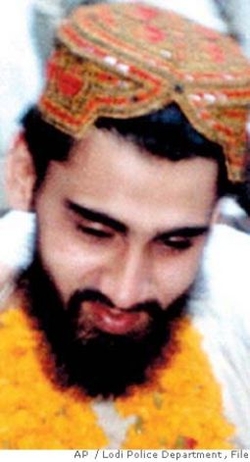Since the first news came from Lodi, California, of the Hayat terrorism case in 2005, I have been fascinated by the town's Pakistani community, which resembles those of the British Midlands more than those the United States: isolation from the rest of the population, importation of brides and imams, and linguistic inability in English. Indeed, the most striking thing of all, for me, was the last point. To quote from another weblog entry of mine:
Hamid Hayat, 22, arrested on his return from what he admits was a jihadist camp in Pakistan, is an American citizen born in Stockton, California who attended school (though only up to the sixth grade) in the United States. That being the case, why does the Los Angeles Times write that, "Apparently unable to follow the proceedings in English, Hayat listened with the help of an Urdu translator"? Perhaps it's because Lodi contains an Urdu-speaking ghetto; an earlier article quotes one Pakistani immigrant, Raja Khan, estimating that around 80 percent of Lodi's Pakistanis are not fluent speakers of English. (In the absence of the two imams yesterday, the mosque service was held in Urdu.) June 14, 2005 update: Johnny Griffin III, the lawyer for Hamid's father, says the Hayats didn't make some statements attributed to them in the complaint. "For one thing, there was no interpreter present, and Hamid speaks and understands very little English." July 8, 2005 update: "Hamid Hayat was born in the United States and at age 9 moved to Pakistan for about nine years before returning to Lodi," reports the Sacramento Bee today, partially clearing up the mystery – but how many American nine-year-olds cannot speak English? July 23, 2005 update: A cousin of Hamid Hayat, Usamaa Ismail, reports the Lodi News-Sentinel, "maintains that his cousin was either tricked into telling agents he allegedly attended a terrorism training camp in Pakistan or that agents misunderstood his words spoken in Pushtu, the language spoken by many Pakistanis in Lodi."
An undated photo of Hamid Hayat.
Today, Neil MacFarquhar fleshes out the sociological picture a bit at "Echoes of Terror Case Haunt California Pakistanis." First, this community traces its origins to a different era:
Lodi, a city of 62,000 people 72 miles east of San Francisco, is something of an anomaly among Pakistani immigrants. Most come to the United States to pursue professional careers, to become doctors or academics in large cities. But mainly rural peasants started coming to Lodi around 1920, and residents say 80 percent of the town's 2,500 Muslims are Pakistanis. They came as agricultural laborers and never really assimilated, preserving their traditional ways by dispatching the young back home for arranged marriages. … "If you have a son or a daughter who gets engaged back in Pakistan, at least one parent is going to be illiterate, and if the man is illiterate, he will definitely kick it with the people from back home." … One of the strongest elements in that culture is that men and women do not mingle in public. Many Pakistani girls in Lodi are taken out of the school system and taught at home once they reach puberty, school officials said.
Second, there is the suspicion in the air:
Members of the Pakistani community here distrust one another almost as much as they do outsiders. Even now, residents with evidence of sudden wealth, like a new car, are immediately rumored to be on the F.B.I.'s payroll. Anything connected to the government is inherently suspect. Some people have stopped home visits by social service agencies; others have balked at writing their Social Security numbers on government documents. Some residents returning from Pakistan avoid including their Lodi addresses on their United States customs forms. "You don't use the word 'terrorist'; you don't use the word 'bomb,' because people's ears are up instantly," said Taj Khan, a retired engineer and an unsuccessful candidate for the Lodi City Council. "People are looking at each other with suspicion to see who is the F.B.I. informant, who will rat on whom?"
Third, there is the need to appear less Muslim:
Khalid Farooq has shunned the low-slung yellow bungalow that serves as the Pakistani community's mosque here for nearly two years, ever since a father and son who worshiped there were arrested on suspicion of being foot soldiers for Al Qaeda. … If he runs an errand at someplace like Wal-Mart, away from the neat, tree-lined streets that constitute the heart of Lodi's Pakistani neighborhood, Mr. Farooq trades his traditional baggy clothes for standard American attire, he said, as often as four times in one day. … There are no Pakistani restaurants and just two shops, one selling fabric and the other a grocery specializing in items like the half-white, half-wheat flour needed to make naan bread. Razia Farooq, Mr. Farooq's wife, sells gauzy bolts of fabric in pink and tangerine and lavender. The small-town banter from other Lodi residents evaporated after the arrests, Mrs. Farooq said, with any woman walking on the street in her traditional clothes likely to hear "Why don't you go back to your own country!" shouted with expletives from a passing car. Her store is unmarked, and after the arrests she installed blinds because customers worried that anyone passing might notice Pakistanis and do something violent.
Comment: This subject deserves much more attention. (April 27, 2007)

